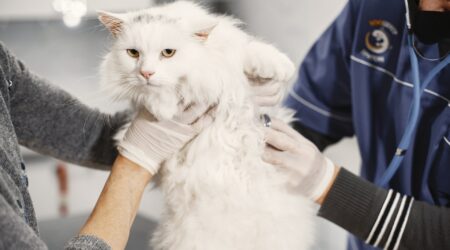Understanding and Preventing Psychological Problems in Cats
Cats are social creatures and can experience a range of psychological problems that can have a significant impact on their health and well-being. Psychological problems in cats can be caused by a variety of factors, including changes in routine, moving to a new home, the introduction of a new pet, or lack of socialization. It’s important for cat owners to be aware of the potential psychological issues that their feline friend may experience and take steps to prevent or address them.
Separation Anxiety
One of the most common psychological problems in cats is separation anxiety, which occurs when cats become stressed and anxious when their owners are away from home for extended periods. Separation anxiety in cats can manifest in a variety of ways, including excessive meowing, destructive behavior, and litter box issues. Cats with separation anxiety may also become overly attached to their owners and may follow them around the house or demand constant attention.
To prevent separation anxiety in cats, it’s important to provide them with plenty of environmental enrichment and toys to keep them occupied while you’re away. You may also want to consider hiring a pet sitter or asking a friend or family member to check on your cat while you’re out. Additionally, ensure that your cat has access to a comfortable and safe space, such as a cat tree or cozy bed, where they can retreat and feel secure. It’s also important to gradually acclimate your cat to your absence by starting with short periods of time away and gradually increasing the duration.
Feline Stress
Stress can have a significant impact on a cat’s health and can lead to a variety of physical and behavioral issues. Common sources of stress in cats include changes in routine, moving to a new home, or the introduction of a new pet. Cats may also experience stress from loud noises, such as fireworks or thunderstorms. Symptoms of stress in cats may include increased vocalization, hiding, and changes in appetite or litter box habits.
To prevent stress in cats, it’s important to provide them with a stable routine and a comfortable living environment. Ensure that your cat has plenty of opportunities for play and exercise, and consider introducing environmental enrichment such as scratching posts, toys, and interactive puzzles. Additionally, you may want to consider using pheromone products such as Feliway, which can help to reduce stress and anxiety in cats. If you suspect that your cat is experiencing stress, it’s important to identify and address the underlying cause as soon as possible to prevent the development of further psychological problems.
Aggression
Some cats may exhibit aggressive behavior towards people or other animals. Aggression in cats can be caused by a variety of factors, including fear, territorial behavior, and play aggression. It’s important to address aggressive behavior in cats as soon as possible, as it can pose a risk to both humans and other animals.
To prevent aggression in cats, it’s important to ensure that they have a comfortable living environment and plenty of opportunities for play and exercise. Additionally, you may want to consider working with a qualified animal behaviorist to identify the root cause of your cat’s aggression and develop a plan to address it. In some cases, medications may be necessary to help manage aggressive behavior.
Compulsive Behaviors
Some cats may develop compulsive behaviors, such as excessive grooming, pacing, or tail chasing. These behaviors can be a sign of stress or anxiety and can have a negative impact on a cat’s health and well-being. Compulsive behaviors can also be a sign of an underlying medical condition, such as hyperthyroidism.
To prevent compulsive behaviors in cats, provide them with a stimulating environment that includes plenty of toys and opportunities for play and exercise. Additionally, ensure that your cat has a stable routine and gets plenty of affection and attention from their owner. If you suspect that your cat is experiencing compulsive behaviors, it’s important to consult with a veterinarian to rule out any underlying medical conditions. You may also want to consider working with a qualified animal behaviorist to identify the root cause of your cat’s compulsive behaviors and develop a plan to address them.
Depression
Depression is a psychological problem that can occur in cats, particularly in older cats or those who have experienced significant changes in their environment or routine. Symptoms of depression in cats may include decreased appetite, lethargy, hiding, and decreased interest in play or socialization.
To prevent depression in cats, it’s important to provide them with a stable and comfortable living environment and plenty of opportunities for play and exercise. Additionally, regular interaction and affection from their owner can help to prevent feelings of isolation and loneliness. If you suspect that your cat is experiencing depression, it’s important to consult with a veterinarian to rule out any underlying medical conditions and to develop a plan to address the psychological issues.
Conclusion
Psychological problems in cats are common and can have a significant impact on their health and well-being. By understanding the potential psychological issues that cats may experience, cat owners can take steps to prevent or address them, including providing a comfortable and stimulating living environment, regular exercise and playtime, socialization, and affection from their owner. It’s also important to seek professional help if your cat is experiencing any psychological problems that are affecting their quality of life.




Leave a Reply